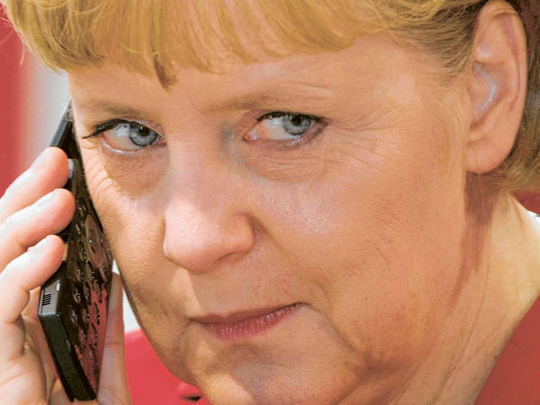
Tokyo: Group of Seven nations sought to head off a collapse in investor confidence after the US sovereign-rating cut and a slump in Italian and Spanish debt intensified threats to the global economy.
G7 finance ministers and central bank governors pledged in a statement to "take all necessary measures to support financial stability and growth." Officials will inject liquidity and act against disorderly currency moves as needed, they said after a call late Sunday European time. The G20, which includes emerging markets, issued a similar communique.
Stocks extended declines that have wiped $5.4 trillion (Dh19.8 trillion) off equity markets since July 26, driven investors to Treasuries and gold and rattled consumer confidence already hurt by European fiscal tightening and elevated American unemployment. The European Central Bank signalled it will buy Italian and Spanish bonds, and Japan warned it may intervene again to stem gains in the yen.
Decisive action
"Actions speak louder than words," said Richard Barwell, an economist at Royal Bank of Scotland Group in London. "In the short run, it might be better they say something rather than nothing, but we're probably at the stage now more where people want to see decisive action."
Stocks fell in Asia and European stocks resumed their decline after a selloff in mining companies. That overshadowed a rally in financial shares as the European Central Bank bought Spanish and Italian debt, according to five people with knowledge of the transaction.
Treasuries climbed, sending the yield on the ten-year note down five basis points to 2.51 per cent and the five-year yield seven basis points lower to 1.18 per cent. The two-year yield fell as much as four basis points to a record 0.2520 per cent after Japanese Finance Minister Yoshihiko Noda said US Treasuries were attractive.
G7 policy makers committed to "coordinated action where needed," and to "consult closely in regard to actions in exchange markets," even as they reiterated support for market-set currencies. The group last mounted a joint foreign-exchange intervention in March, countering a surge in the yen after Japan's earthquake. While the G7 statement was "better than nothing," it's not likely to stem the dollar's decline, said Hiroaki Muto, a senior economist at Sumitomo Mitsui Asset Management in Tokyo.
Muto added the scope for coordinated policy action is limited by inflation pressures, caps on spending, and interest rates that are already near zero in nations such as the US and Japan.
The yen rose 0.7 per cent to 77.88 per dollar, about two per cent from the postwar high reached in March. Investors flocked to the yen and franc amid the turmoil as currencies of nations with current-account surpluses. The yen's gain risked damping a recovery from Japan's estimated three quarters of economic contraction through June, by hurting exports.
Avoiding another "severe" recession may be "mission impossible," Nouriel Roubini, co-founder and chairman of Roubini Global Economics said.
In Europe, the debt crisis pushed yields on Italy's ten year government securities to 6.1 per cent from 4.6 per cent in two months, while Spain's yields soared to as high as 6.29 per cent, from 5.14 per cent in March. Ten-year borrowing rates for both nations last week reached the most since before the euro was introduced in 1999.
"No change in fundamentals warrants the recent financial tensions faced by Spain and Italy," said the G7, made up of the US, Canada, UK, Germany, France, Italy and Japan. Policy measures announced by Italy and Spain will "strengthen fiscal discipline and underpin the recovery in economic activity and job creation," the officials said.












